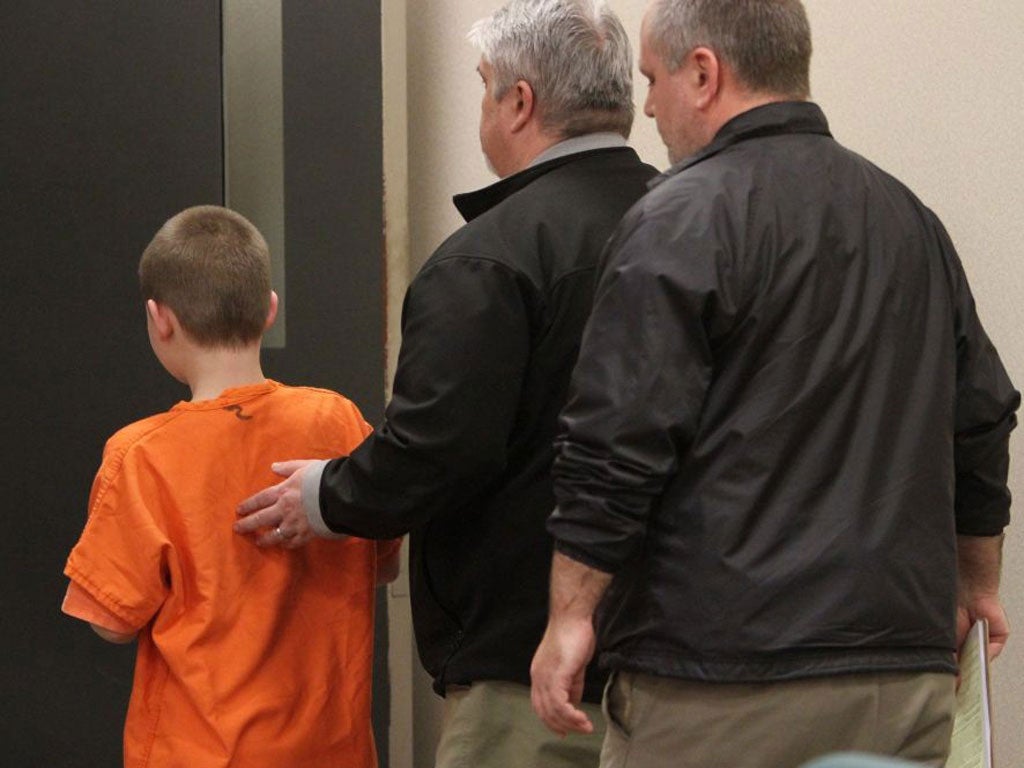Orange jumpsuit for nine-year-old who's accused of shooting girl
Court to rule whether boy who brought gun to school had mental capacity to understand crime

Your support helps us to tell the story
From reproductive rights to climate change to Big Tech, The Independent is on the ground when the story is developing. Whether it's investigating the financials of Elon Musk's pro-Trump PAC or producing our latest documentary, 'The A Word', which shines a light on the American women fighting for reproductive rights, we know how important it is to parse out the facts from the messaging.
At such a critical moment in US history, we need reporters on the ground. Your donation allows us to keep sending journalists to speak to both sides of the story.
The Independent is trusted by Americans across the entire political spectrum. And unlike many other quality news outlets, we choose not to lock Americans out of our reporting and analysis with paywalls. We believe quality journalism should be available to everyone, paid for by those who can afford it.
Your support makes all the difference.A day after a nine-year old boy appeared in the dock crying and dressed in an orange prison jumpsuit usually worn by adults, a judge in Washington state was last night deciding whether he will be arraigned on criminal charges over the accidental shooting of a fellow pupil in an school classroom.
Police officials in Bremerton, west of Seattle across Puget Sound, said the boy put his backpack on his desk as a class was ending on Wednesday and a gun inside accidentally discharged. The bullet pierced the abdomen of Amina Kocer-Bowman, eight, who was in a critical condition yesterday.
Looking dazed and in tears, the boy sat in the courtroom at an initial hearing on Thursday as his father, Jason Cochran, rubbed his back. Bail was set by the judge at $50,000 (£31,500). If bail is met, the boy will be released from a juvenile detention centre into the care of his legal guardian, an uncle.
Prosecutors said they intended to charge the boy with unlawful possession of a gun, bringing a dangerous weapon to school and third-degree assault. In Washington, a minor aged between eight and 12 can face criminal charges, but only if a court determines that they have the mental capacity to understand what they have done.
Judge Anna Laurie, who will rule in this case, attempted to gauge the boy's mental ability at the hearing. "Do you read at grade level?" she asked him. After looking for help to his father and his uncle, he replied: "I have a little trouble reading."
Natalie Poss, his teacher, said she heard a loud bang and then saw the girl slumping at her desk. It was, she said, "every teacher's worst nightmare". Insisting the boy had "a lot of good in his heart", she said she was surprised he would bring a gun to school. "I know he didn't intend this to happen. And I know he's hurting tonight," she said.
The boy's family background was apparently fraught. Both his parents, police said, had extensive criminal records. He had been in the care of a grandmother until her death a year ago, and had since been under the guardianship of his uncle. Investigators said the boy took the gun from his mother's home during a parental visit. He had earlier boasted to a classmate that he would bring "his Dad's gun" to school and intended then to run away.
"I just want him back home," Patrick Cochran, the uncle, said after the hearing. "He's a good kid. It's all I can say. I apologise to the family of that girl. I really do." Jason Cochran similarly defended his son, saying: "I just want everyone to know that my kid made a mistake. It was a terrible mistake."
Washington ranks near the bottom of states on regulating access to guns. Nor is it among the 27 states that have laws pertaining to guns and minors, including some that would foresee criminal penalties for adults who allow firearms to get into the hands of children. Most legal experts say it is very rare for someone so young to be charged with a crime. Gail Hammer, a professor of law at Gonzaga University in Spokane, Washington, said that even if the boy were to be convicted, he would not go to an adult prison. "Generally with young children they try to deal with it in the juvenile system," she said.
In 2000, six-year-old Kayla Rolland was fatally injured by a six-year-old classmate in Michigan who brought a gun from home – but the boy was not criminally charged. In that case, prosecutors said the boy was too young to be held responsible.
Join our commenting forum
Join thought-provoking conversations, follow other Independent readers and see their replies
Comments